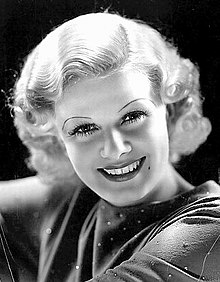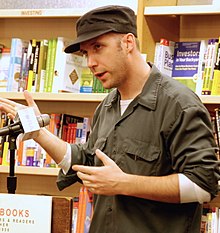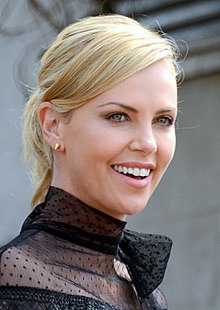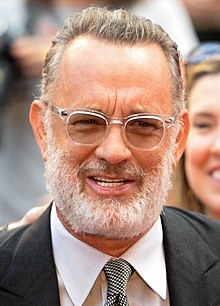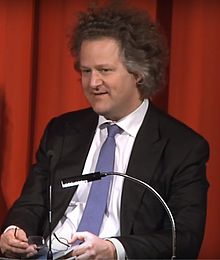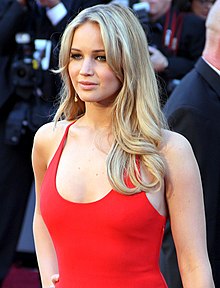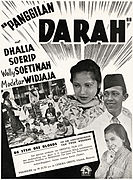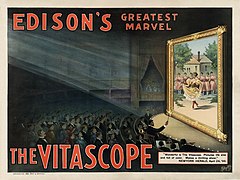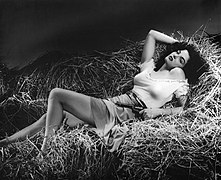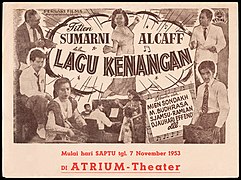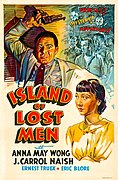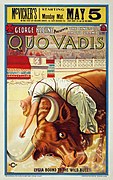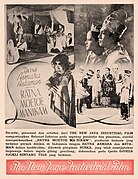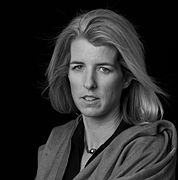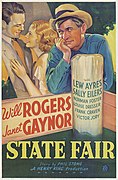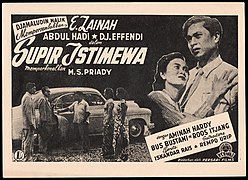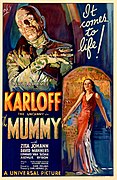Portal:Film
The Film Portal
 A film, also called a movie, motion picture, moving picture, picture, photoplay, or flick—is a work of visual art that simulates experiences and otherwise communicates ideas, stories, perceptions, emotions, or atmosphere through the use of moving images that are generally accompanied by sound and (less commonly) other sensory stimulations. The word "cinema" is a shortening of the word "cinematography" and is used to refer to either filmmaking, the film industry, the overall art form, or a movie theater. (Full article...)
A film, also called a movie, motion picture, moving picture, picture, photoplay, or flick—is a work of visual art that simulates experiences and otherwise communicates ideas, stories, perceptions, emotions, or atmosphere through the use of moving images that are generally accompanied by sound and (less commonly) other sensory stimulations. The word "cinema" is a shortening of the word "cinematography" and is used to refer to either filmmaking, the film industry, the overall art form, or a movie theater. (Full article...)
Featured articles -
Harry Potter and the Goblet of Fire is a 2005 fantasy film directed by Mike Newell from a screenplay by Steve Kloves. It is based on the 2000 novel Harry Potter and the Goblet of Fire by J. K. Rowling. It is the sequel to Harry Potter and the Prisoner of Azkaban (2004) and the fourth instalment in the Harry Potter film series. The film stars Daniel Radcliffe as Harry Potter, alongside Rupert Grint and Emma Watson as Harry's best friends Ron Weasley and Hermione Granger respectively. The story follows Harry's fourth year at Hogwarts as he is chosen by the Goblet of Fire to compete in the Triwizard Tournament.
Principal photography began in early 2004, and the film premiered worldwide on 18 November 2005. Five days following release, it had earned over US$102 million at the North American box office, the third-highest first-weekend tally for a Harry Potter film behind Harry Potter and the Deathly Hallows – Part 1 and Part 2. Goblet of Fire enjoyed a successful run at the box office, grossing $896 million worldwide, the highest-grossing film of 2005 and the sixth-highest-grossing film in the series. (Portal:Film/Featured content)
General images -
Selected image
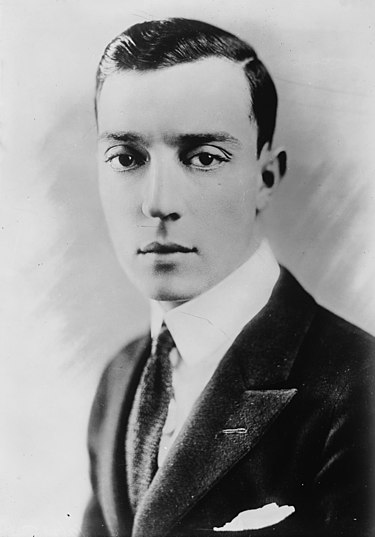
Buster Keaton (born Joseph Frank Keaton, October 4, 1895 – February 1, 1966) was an American silent film comic actor and filmmaker. His trademark was physical comedy with a stoic, deadpan expression on his face.
Did you know...
- ... that the Church of St Giles, Stoke Poges, which may have inspired the "Elegy Written in a Country Churchyard", is featured in a James Bond film?
- ... that film critic and censor D. I. Suchianu wanted Romanian moviegoers to cease "falling asleep whenever they're not shown a naked breast [or] a hip that's getting some action"?
- ... that "Dark Avenger", a song from Manowar's album Battle Hymns, is narrated by actor Orson Welles?
- ... that the live-action drama adaptation of Our Dining Table was filmed in the hometown of one of the lead actors?
- ... that actor Corey Feldman knocked his own tooth out at Shank Hall?
Selected biography -
Jean Harlow (born Harlean Harlow Carpenter; March 3, 1911 – June 7, 1937) was an American actress. Known for her portrayal of "bad girl" characters, she was the leading sex symbol of the early 1930s and one of the defining figures of the pre-Code era of American cinema. Often nicknamed the "Blonde Bombshell" and the "Platinum Blonde", Harlow was popular for her "Laughing Vamp" screen persona. Harlow was in the film industry for only nine years, but she became one of Hollywood's biggest movie stars, whose image in the public eye has endured. In 1999, the American Film Institute ranked Harlow number 22 on its greatest female screen legends list.
Harlow was first signed by business magnate Howard Hughes, who directed her first major role in Hell's Angels (1930). After a series of critically failed films, and Hughes' loss of interest in her career, Metro-Goldwyn-Mayer bought out Harlow's contract in 1932 and cast her in leading roles in a string of hits built on her comedic talent: Red-Headed Woman (1932), Red Dust (1932), Dinner at Eight (1933), Reckless (1935) and Suzy (1936). Harlow's popularity rivaled and then surpassed that of MGM's top leading ladies Joan Crawford, Greta Garbo and Norma Shearer. She died at the age of 26 of kidney failure while filming Saratoga. MGM completed the film with the use of body doubles and released it less than two months after her death; it became the highest-grossing film of 1937, as well as the highest-grossing film of her career. (Full article...)
Featured lists -
News
- September 2: Tributes paid to recently deceased US actor Chadwick Boseman
- October 7: Mockumentary Mister America has world premiere
- May 16: Actor Doris Day dies at 97
- January 22: Former U.S. intelligence agent Tony Mendez, architect of 'Argo' rescue, dies at 78
- Upcoming events
WikiProjects
Selected quote
Main topics
| Filmmaking |
|---|
 |
| Glossary |
- Terms - Animation • Beta movement • Camera • Cult film • Digital cinema • Documentary film • Dubbing • Experimental film • Fan film • Film crew • Film criticism • Film festival • Film frame • Film genre • Film journals and magazines • Film industry • Film manifesto • Film stock • Film theory • Filmmaking • History of film • Independent film • Lost film • Movie star • Narrative film • Open content film • Persistence of vision • Photographic film • Propaganda • Recording medium • Special effect • Subtitles • Sound stage • Web film • World cinema
- Lists - List of basic film topics • List of film topics • List of films • List of film festivals • List of film formats • List of film series • List of film techniques • List of highest-grossing films • List of longest films by running time • List of songs based on a film or book • Lists of film source material • List of open content films
Featured content
Subcategories
Subportals
Related portals
Things you can do
- Add
{{portal|Film}}to the See also section of film-related articles. - Tag the talk pages of film related articles with the {{WikiProject Film}} banner.
- Explore the list of English language films without an article
- Check tasks and announcements at WPFILM Announcements.
- Collaborate with other participants at Wikipedia:WikiProject Film.
- Join one of the task forces at Wikipedia:WikiProject Film/Sidebar.
Associated Wikimedia
The following Wikimedia Foundation sister projects provide more on this subject:
 Commons
Commons
Free media repository Wikibooks
Wikibooks
Free textbooks and manuals Wikidata
Wikidata
Free knowledge base Wikinews
Wikinews
Free-content news Wikiquote
Wikiquote
Collection of quotations Wikisource
Wikisource
Free-content library Wikiversity
Wikiversity
Free learning tools Wiktionary
Wiktionary
Dictionary and thesaurus
















![Image 15Louis Poyet [fr]'s engraving of the mechanism of the "fusil photographique" as published in La Nature (april 1882) (from History of film technology)](https://upload.wikimedia.org/wikipedia/commons/thumb/f/f0/Fusil_photographique_Marey2.png/120px-Fusil_photographique_Marey2.png)































